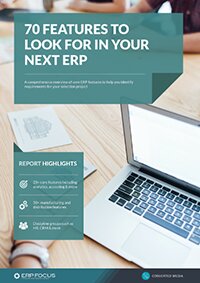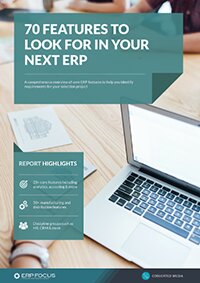Three ERP requirements your finance team will have
My finance team could be different from yours, but I suspect they would want a complete implementation with fully automatic transactions completed when they return to work on Monday – And a rebate check waiting for the controller already to cash.
Maybe we should quit dreaming and think of more practical considerations. Here are some baseline requirements that your finance staff will have when you replace your ERP, and how to meet them.
GAAP compliance
Finance would expect the ERP to be fully GAAP-compliant wherever they do business now or in the foreseeable future.
This requirement is not likely to be a problem for any of the major players, but is still an extremely important consideration. Financial statements must comply with government rules everywhere. That said, finance would also want the ability to develop statements for other purposes easily. Those could be project-based. They could also be to satisfy a particular board member who only wants to see statements in a way comfortable to only that person. Of course, these GAAP-related requirements should be built-in or very easily designed.
Fit for the business’s financial processes
Financial teams know they are part of larger enterprise teams. An ERP must meet everyone’s needs too whether the business is a distributor, a manufacturer, a bank, or any other business. If a business sells through many different channels, finance would like sales orders, shipments, returns, and any normal transaction to post to the correct revenue and expense accounts regardless of the products or channels.
All users, regardless of their functional role are connected to finance. If an engineer completes a purchase requisition, finance should have confidence the engineer can easily select the correct general ledger account to be charged. A production worker on the shop floor enters time against a job and work in process inventory increases at the same time.
Features that go beyond basic accounting
Financial teams include accountants and analysts. Human Relations often are part of the team too. So, the finance team could want HR management tools included in the finance ERP module. In this role, finance will ensure employee evaluations are completed on time and that employees are developed over time to reach their potential and satisfy the business’ needs.
Financial analysts sometimes need to help with quality or other departments’ analytical needs. Business intelligence tools that are robust and can select data from the ERP and other databases are important here.
Finance generates many ERP transactions from daily invoicing of customer shipments to monthly depreciation charges. Finance wants defaults established to ease transactions and they would like to have entries repeat each period as needed.
Free white paper

70 features to look for in your next ERP
A comprehensive guide to help you identify requirements for your ERP selection

Related articles
-

ERP finance modules guide (finance features in ERP)
ERP finance module features that will help you keep on top of your business's expenditure
-

CMMC Compliance: What Aerospace and Defense Manufacturers Need to Know
Key insights on CMMC compliance, deadlines, and securing DoD contracts with CMMC 2.0 certificatio...

